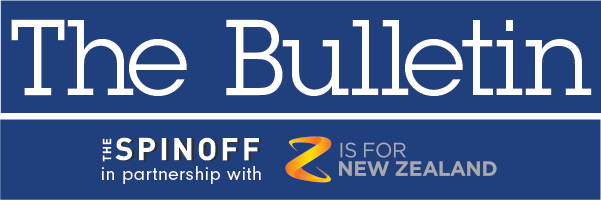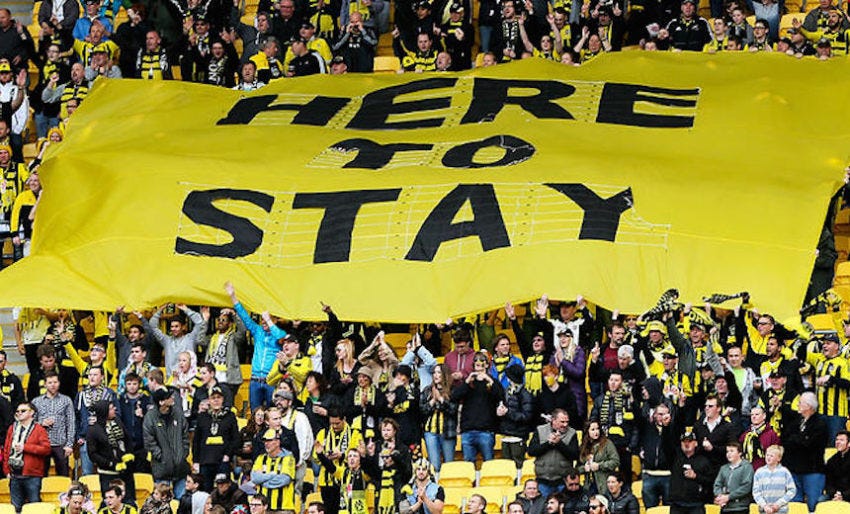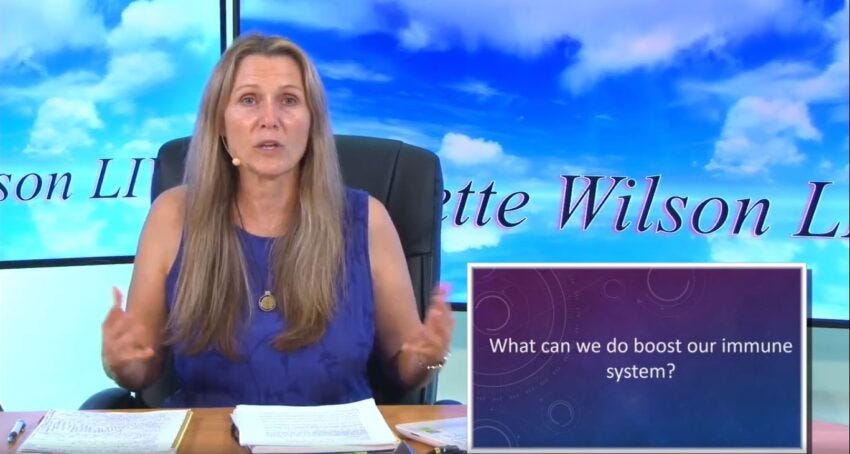Winners and losers from sport's spending spree
For the Wellington Phoenix, it means survival. For basketball, it was another bitter snub.

Good morning and welcome to The Bulletin for Friday 5 June, by Alex Braae for The Spinoff. Presented in partnership with Z Energy.
In today’s edition: Millions of dollars divvied up by Sport NZ, MSD’s problem with wrongly denied payments grows, and internal coalition battles emerge in time for election.

Image: Wellington Phoenix fans after a past survival scare (Getty Images)
It's Friday, and there hasn't been a lot of it recently, so we're going to start with sport today. Don't worry, it's really more a story about the allocation of resources. Millions of dollars worth of government support has been divided up by Sport NZ, and while it is an initial spend of much more to come, some have done much better than others out of it. And one sport has missed out, right at a time that it would have really helped.
The big traditional codes have done well out of the allocation. In domestic competitions, Netball NZ has got $2.2 million for the ANZ Premiership, and NZ Rugby has got $1.25 million for Super Rugby Aotearoa. That money is tied to restarting the competitions, and as Stuff's Mark Geenty reports, it is causing a rethink for netball's major competition taking place behind closed doors. In overseas leagues, the Phoenix and Warriors have got $950k and $200k respectively. Stuff's Mark Geenty (again) reports that for the Phoenix especially, the money was probably the difference between staying or folding. Even though the club was in a much more stable position within the competition before Covid-19, the halt to a promising season put extreme pressures on the finances.
Rugby's finances are extremely tight, but Super Rugby Aotearoa is now offering a glimmer of hope. There have been major job and wage cuts throughout the system, the whole Heartland Championship is off for the year, and the great money maker of the All Blacks is looking shaky. The NZ Herald's (paywalled) Chris Keall had an indicative piece: NZ Rugby owns a smaller share of Sky TV than it once did, because they didn't participate in a recent capital raising share sale put on by the broadcaster. But the thing is, they both now have something the other is desperate for – a competition that people actually care about. And games will start taking place right when people are (probably) allowed to go into stadiums again, suggesting the competition could become a real phenomenon.
But basketball has once again missed out. It is a rapidly growing sport here, and has a ginormous international profile. Newshub reports the National Basketball League will basically be taking place as a pay per view TV event, out of one venue. The idea is to cash in on overseas leagues being suspended. ESPN's game-breaker Adrian Wojnarowski reports that a 22 team NBA is being proposed, to start as late as July 31, meaning the NBL would have a clear run from late June. Their fault with Sport NZ was not having a finalised competition in place at the time of asking.
The basketball community might have reason to feel aggrieved at that. Stuff's Marc Hinton reports the situation has been heavily criticised by NZ basketball boss Iain Potter, who is alleging “historical and institutional bias” against his sport. He's got a point – even with only seven teams the NBL is a competition with a lot of history. Not all of it is proud, but a lot of it is, and that success has often been overlooked by the various gatekeepers of sport in this country.
The finances of sporting organisations will also be being hit by a loss of TAB revenue. That organisation itself is facing massive cuts, but it is also a source of funding for sport, as a share of money bet on competitions goes back towards the relevant national sporting organisation. That was raised as a major issue during the Epidemic Response Committee, Radio NZ reported at the time, with Netball NZ's Jennie Wyllie saying that model needs a rethink.
Just quickly, a message from The Spinoff's managing editor Duncan Greive:
"The arrival of Covid-19 and lockdown changed The Spinoff, transforming our editorial to focus on the biggest story of our lives, taking a small team and making it a seven day a week news operation. But it also fundamentally changed us as a business, too. Prior to the crisis, around 20% of our editorial costs were funded by our Members. Now, that figure is north of 50%. The loss of some key commercial clients meant that change has to be permanent. If you're already a member, please know that all at The Spinoff are incredibly grateful for your help. If you're not, and can afford to contribute, please consider doing so – it really is critically important to our ability to cover the next phase of the crisis, in all its complexity."
The problem is growing for MSD after years of wrongly denying benefits to those who had been made redundant. Radio NZ's Glen Scanlon reports a review has found it happened in almost 9% of cases, leading to questions over whether or not that constitutes a "systemic issue". MSD says it doesn't because in the majority of cases, the law was applied correctly. However, a benefit law specialist says the figure is alarming, and if it really wasn't a systemic issue he'd expect that figure to be more like 1-2%.
Internal coalition battles are once again breaking through to the surface, as they have many times over this government's term. The terrain this time is over a rent relief package for businesses. Newstalk ZB reports NZ First leader Winston Peters fired first, saying Labour's original proposal was poorly targeted. The NZ Herald later reported the response from Labour's Andrew Little, who described NZ First's original proposal as "laughable", and that Labour's position had been mischaracterised. All in all, it appears to be an example of NZ First trying to distance itself from a much larger coalition partner with the election coming up – a strategy that the party is being relatively open about, reports Stuff.
An interesting and significant detail around the recent round of freshwater reforms is the effect they could have on emissions. Newsroom's Marc Daalder has put out a typically crunchy story on this, based on a quietly released cabinet paper that notes that land use changes and afforestation would lead to massive reductions, to a far greater degree than other emissions-related policies. It is perhaps unsurprising that it was released quietly, because land use change is a deeply sensitive issue in the farming-oriented rural world – for example, the issue led to the formation of the group 50 Shades of Green.
A new set of data has shed a lot more light on the proliferation of 'interest only' loans, and appropriately this interesting data has been reported on by Interest. Basically, it means loans that normal repayments are on hold for, and only the interest is being serviced, so indicates a situation where a mortgagee is having cash flow issues. Over March and April, there has been a massive spike – well above the normal noise of such graphs, and in monetary terms saw billions of dollars moved into this category.
Jetstar looks like it is on the verge of returning to the domestic flight market, reports John Anthony for Stuff. Pilots are being geared up and flights have gone on sale from July. Because they operate as a budget airline, the return is probably a bit contingent on a return to level one, and the removal of social distancing requirements on transport.
Got some feedback about The Bulletin, or anything in the news?
Drop us a line at thebulletin@thespinoff.co.nz

Right now on The Spinoff: Emilie Rākete writes about how violence against Māori has deep roots within the New Zealand police. Justin Giovannetti reports on the tougher restrictions coming at the border. Alice Webb-Liddall reports of a race relations commissioner rebuke for an allegedly racist show coming to TVNZ. Toby Manhire gets amongst the claims of a psychic healer over a product that supposedly could protect against Covid. Michael Andrew looks at new data on the impact of Covid-19 on small business. And we've republished an old Duncan Greive interview with rugby player Dan Carter about underwear, after Carter signed on to play Super Rugby Aotearoa.
For a feature today, a hilarious look at how an airport turned a wild set of conspiracy theories into a marketing feature. And in fairness, some of the murals that have been put up around Denver Airport do have a kinda creepy vibe. The piece from Popular Mechanics really leans into the subject matter and makes the most of it. Here's an excerpt:
“It should be obvious when one views Leo Tanguma's murals at DIA that they are very positive,” says Leo’s wife, Jeanne, over email.
Obvious is a stretch. One of Leo’s four full-wall murals depicts a dead child laying in a coffin. There’s also a steampunk fascist impaling a dove with a sword, crying children fleeing a burning building, a sea turtle trapped in a net, and a Native American woman without eyes.
To online conspirators, Leo’s murals are a message from an elite cabal planning to steer the world into the apocalypse and raise their New World Order from the ashes. Leo declines to be interviewed about “the ridiculous conspiracy theories” surrounding his work, according to Jeanne. She says the murals depict the “children of the world coming together to rehabilitate the environment and struggle for world peace.”
That's it for The Bulletin. If you want to support the work we do at The Spinoff, please check out our membership programme




